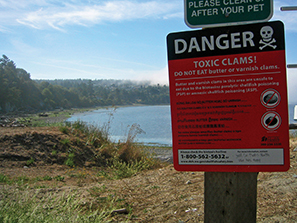 After a rainstorm, you have probably noticed water running over large flat surfaces, such as parking lots, roofs, driveways, sidewalks, farm fields, roads, and lawns. This surface water runoff is known as stormwater. As we replace forests and fields with hard impervious surfaces, more rain runs off the land instead of soaking into the soil. This increases the amount of stormwater runoff, which has been identified as the leading contributor to water quality pollution in the Puget Sound. Pollutants carried by stormwater, such as heavy metals, petroleum products, excess nutrients and pathogens, have harmed many creeks, lakes, rivers and bays in Washington.
After a rainstorm, you have probably noticed water running over large flat surfaces, such as parking lots, roofs, driveways, sidewalks, farm fields, roads, and lawns. This surface water runoff is known as stormwater. As we replace forests and fields with hard impervious surfaces, more rain runs off the land instead of soaking into the soil. This increases the amount of stormwater runoff, which has been identified as the leading contributor to water quality pollution in the Puget Sound. Pollutants carried by stormwater, such as heavy metals, petroleum products, excess nutrients and pathogens, have harmed many creeks, lakes, rivers and bays in Washington.
Orca whales, two species of salmon, and bull trout are protected under the federal Endangered Species Act and are threatened with extinction. Loss of habitat due to development and stormwater pollution are both contributing factors to their status. Shellfish harvesting at many of our beaches is restricted or prohibited due to pollutants carried in stormwater runoff.
Some other effects from stormwater runoff include:
- Property damage. Flooding has increased in some areas because water can‘t soak slowly into the ground. Instead it runs off hard surfaces and, in a heavy rain, can lead to flooding, erosion and property damage.
- Water pollution. Water becomes polluted as it runs across lawns, driveways and other hard surfaces, when it collects oil, gas, fertilizers, pet waste and more. Water eventually carries these contaminants to our lakes, streams, rivers, wetlands, and marine waters.
- Beach and shellfish closures. Bacteria, viruses and other pathogens from pet and livestock waste, as well as failing septic systems can close beaches for swimming and shellfish harvesting, as well as harm pets and wildlife.
- Increased algal growth. Nutrient pollution from livestock manure, croplands, landscape runoff, and failing septic systems can cause excessive algal growth. As the algae die and decompose they consume dissolved oxygen in the water to the detriment of fish and other organisms that need it.
- Clouded water. Sediment (loose soil) can cause turbidity (cloudiness) in water, reducing the amount of light penetrating the water. This inhibits growth of aquatic plants that fish and shellfish depend on. It can also clog up the gravel in streambeds that salmon use to lay their eggs in. Sediment can enter stormwater from construction sites, eroding stream banks, agricultural fields, and other disturbed areas.